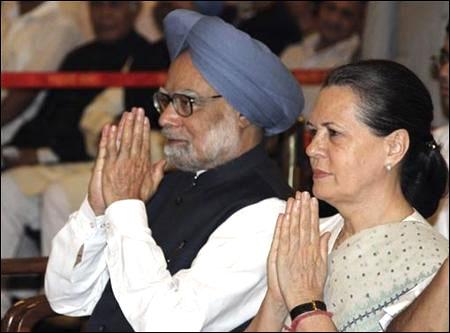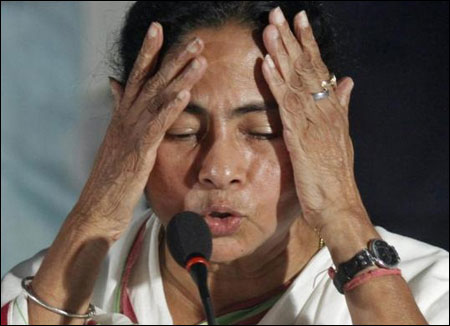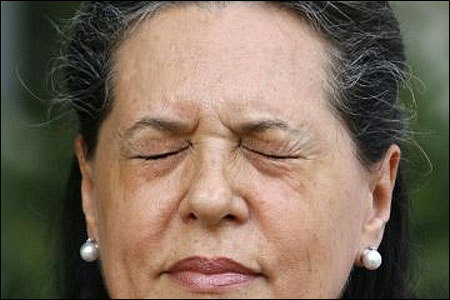Photographs: B Mathur/Reuters A K Bhattacharya
Prime Minister Manmohan Singh's relationship with Congress President Sonia Gandhi has always been a matter of animated discussion among politicians and experts. What kind of freedom does the prime minister enjoy while running the United Progressive Alliance (UPA) government? And, does he have any influence over the Congress president on party matters?
In the early days of UPA-I (2004-2009), there was a general consensus on the nature of relationship between the two. It was widely believed that Gandhi concentrated on how to run the party and the alliance, while Singh with his vast experience in economic administration focused on running the government. The two had an excellent working relationship and both of them enjoyed a mutual trust.
This experiment seemed to have worked and even gave rise to the idea of a new governance structure. There was separation of power and responsibilities. Yet, the government and the party could be run with cohesion and a purposive direction, primarily because of the mutual trust and excellent equation between the two.
Click on NEXT for more...
Is Dr Singh a victim of Indian politics?
Photographs: Rupak De Chowdhuri/Reuters
Yes, there were occasions when doubts arose over the durability and effectiveness of such an arrangement. One such moment was when it appeared that the government and the party did not see eye to eye on the question of signing the Indo-US civil nuclear deal.
The Left parties had opposed the deal and threatened to withdraw their support to UPA-I, if the government went ahead with it. Eventually the Congress party and the government got together and withstood that political storm.
In UPA-II, there has been only one similar situation so far. This was when Mamata Banerjee's Trinamool Congress pulled out of the alliance after the government decided to allow foreign direct investment (FDI) in multi-brand retail. Even here the government and the Congress were unanimous in their approach to the way the controversy was tackled, even though an earlier Cabinet decision on the same issue of FDI in retail could not be implemented for almost about a year. But there were few doubts about whether the party and the government thought differently on the question of FDI in retail.
One reason for the apparent absence of such conflict situations could be the long distance Singh has travelled in his journey as a politician. For much of his first ministerial stint in the early 1990s, Singh was still very much like a technocrat finance minister, impatient with slow change and eager to take tough steps.
When the Congress rule ended in 1996, not many people expected Singh to continue to remain in politics. But he chose to stay in politics and remained within the Congress fold.
Click on NEXT for more...
Is Dr Singh a victim of Indian politics?
Photographs: Reuters
That was a clear sign that Singh was changing his profile. By 2004, when he became prime minister, that transformation was complete. This also helped in the smooth working of the new governance structure experimented by Gandhi, with the prime minister running the government and Congress president looking after the alliance and the party.
Indeed, the new governance structure worked well because Singh had transformed himself as a politician and he was now willing to adjust to political compulsions, even in respect of choosing his council of ministers or taking tough economic decisions - for instance, to plug leakages in various poverty-alleviation schemes.
The synergy between the Congress party and the government headed by Singh has continued in UPA-II as well, and is further confirmation of Manmohan Singh's successful transformation as a politician.
This is why recent comments explaining Singh's inability to take tough decisions and speed up economic reforms to achieve higher growth are a puzzle. Take for instance, renowned economist Jagdish N Bhagwati's recent observation that Singh's ability to deliver reforms is constrained by a political coterie around Sonia Gandhi, which is not committed to the idea of reforms. He has also argued that power has completely shifted to the Congress giving Singh little elbow room to undertake reforms.
Click on NEXT for more...
Is Dr Singh a victim of Indian politics?
Photographs: Adnan Abidi/Reuters
It is a puzzle because Bhagwati has a deep understanding of the way politics plays itself out in India. It is possible he has not taken into account the other major shift that has taken place - the transformation of Singh as a politician, for whom political compulsions take precedence over economic compulsions of reforms.
Singh, like many of his other colleagues in the Cabinet, believes that the Congress derives its strength from aam-aadmi politics and nothing should be done that alienates the so-called aam aadmi. So, if diesel prices cannot be raised or the prices for unsubsidised cooking fuel have to be rolled back, it is to bolster that pro-common man image of the Congress.
To blame the political coterie around Sonia Gandhi for Manmohan Singh's failure to deliver on reforms would be an unfair criticism of the Congress. Today, one of the biggest achievements of the Congress leadership is to have co-opted Singh in the party's ideological mould. Singh is no victim of Gandhi's politics or her political coterie.
Indeed, Singh is now a key member of Gandhi's political coterie. That is also why Gandhi has now endorsed the call for fiscal consolidation - because the entire party, including Singh, has realised that without such measures the economy will miss the growth bus, and the government would not have the necessary revenue to splurge on the Congress party's grand entitlement schemes for underprivileged sections of society.
Singh is not handicapped by Gandhi or her politics. To believe that would be a mistake.






article